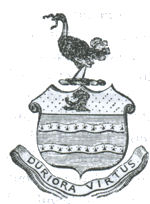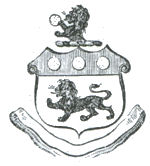Administration of the
Fenton land was divided between the two manors, with the minsral rights
vested in the Duchy of Lancaster offering economic activity without close,
direct intervention.
Post-medieval control passed to lessees who had little daily interest
in their estates; Fenton Vivian was held by the Broades and the Fenton
Culvert quit rents were ultimately sold to Thomas Smith of Great Fenton
Hall whose house was demolished by 1900 leaving only landscaped gardens to
the north of Grove Road. The house gone, the family name survives through
the two pools (Smithpool) adjacent to the main railway line.
Great Fenton House survived at least until the early 1920's.
The approximate location of the three large houses -
some features on the ground can still seen today.
The area marked in red are the 1720 cottages shown on the 1878 map above.
John Smith (of Great Fenton Hall)
'The most considerable portion of the Township has for upwards of a
century past belonged to the highly respectable family of Smith, who,
until within a few years, resided at a large family mansion at Great
Fenton, one of the three principal houses which distinguish that eminence.

John Smith, Esq., late of Elmhurst, near Lichfield, was the head of
this house, and has been spoken of by us as a living person on previous
occasions, but his death has happened whilst this work was in progress. He
was a magistrate of the County, and served the office of Sheriff in 1816,
as his father, Jeremiah Smith, Esq., did in 1762.
This family, from its long standing in the neighbourhood, is entitled
to a genealogical record, which we have extracted from the visitations of
1614 and 1663, in the Herald's Office, and other authorities. The family
is a junior branch of that of the Hough, near Nantwich, descended from Dr.
William Smith, successively Bishop of Lichfield and Lincoln, and founder
of Brazenose College, Oxford, whose heirs of the elder line, a knightly
race, received the further honour of a Baronetcy in the person of Sir
Thomas Smith, A.D. 1660.'
John Smith owned Hallfields Colliery, Northwood and Goldenhill
Colliery, Fenton as well as coalpits in the vicinity of Northwood Park. He
also build the Foley Potteries about 1827, leasing them to Elkin, Knight
and Bridgwood.
Thomas Allen (of Great Fenton House)
'Another considerable landed proprietor in Fenton-Culvert, is Thomas
Allen, Esq., who resides at a venerable brick mansion there, possessing a
most commanding prospect toward Trentham-park, having on one side what
looks like a deep fosse, which probably defended the ancient hall of
Culverd's Low, here seated, but now is converted into fish-ponds.
 Mr.
Allen is great grandson of Dr. Thomas Allen, formerly rector and patron of
Stoke, and Dean of Chester, whose son, the Reverend Thomas Allen, the next
succeeding Rector, sold the advowson. The son of the last-named gentleman
and father of the present Mr. Allen, was Harry Allen, Esq., who died about
50 years ago, but we cannot, after particular inquiry, trace back the
pedigree, of this family correctly, farther than to the Dean, though it
has been seated here from time now immemorial.
Mr.
Allen is great grandson of Dr. Thomas Allen, formerly rector and patron of
Stoke, and Dean of Chester, whose son, the Reverend Thomas Allen, the next
succeeding Rector, sold the advowson. The son of the last-named gentleman
and father of the present Mr. Allen, was Harry Allen, Esq., who died about
50 years ago, but we cannot, after particular inquiry, trace back the
pedigree, of this family correctly, farther than to the Dean, though it
has been seated here from time now immemorial.
John Allen was a landed proprietor at Fenton in the 5th year of the
reign of Queen Elizabeth, and rated upon a par with many of the
gentry of that time. The arms of this family are given in the margin.'
Mrs. Bourne
(of Great Fenton [farm])
'The village-stead of Great Fenton contains a third mansion, being an
old farm-house, modernized and beautified, belonging to and occupied by
Mrs. Bourne, widow of the late John Bourne, Esq. It is divided from that
of Mr. Allen by the ravine and fish-ponds we have mentioned, and equally
favourable for amenity of situation.'
from:
Wards, Borough of Stoke-Upon-Trent
People of the Potteries